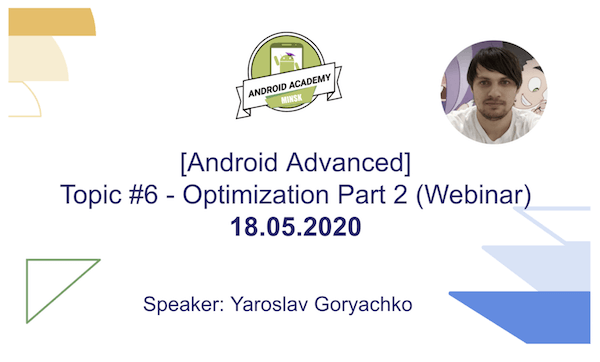18 мая (понедельник) пройдет вебинар Android Advanced Topic #6 — Optimization — Part 2 от Android Academy Minsk.
ФОРМАТ — Вебинар. Трансляция доступна по ссылке.
Вебинар будет проходить на Youtube канале, подпишитесь, чтобы получить уведомление.
Регистрация на вебинар по ссылке.

There are two basic rules for writing efficient code:
- Don't do work that you don't need to do.
- Don't allocate memory if you can avoid it.
Android devices have a lot of cores, so writing smooth apps is a simple task for anyone, right? Wrong. As everything on Android can be done in a lot of different ways, picking the best option can be tough. If you want to choose the most efficient method, you have to know what’s happening under the hood. Luckily, you don’t have to rely on your feelings or sense of smell, since there’s a lot of tools out there that can help you find bottlenecks by measuring and describing what’s going on. Properly optimized and smooth apps greatly improve the user experience, and also drain less battery.
Together with you, we will learn:
Part 2: Best practices
Network
- Logging
- Android Studio Network profiler
- Network Caching
- HTTP 2.0
- Battery profiler
- Android Studio Energy profiler
- Batterystats
- Doze mode
- Work Manager
Database
- Android Studio Database Inspector
- SQLite
- SQLite versions
- EXPLAIN QUERY PLAN
- indexes
GPU
- Frame Rate & VSYNC
- Choreographer
- FPS meter
- Junk (16 ms)
- GPU System Developers Options
Overdraw
- GPU Rendering
- Systrace
App Performance Philosophy
Dependencies configuration
- Dagger, EventBus, SQLite... examples
Event-driven programming paradigm (EDP) & UI
- Android devices evolution
- EDP
- Main Thread
Dependencies/classes initialization
- Eager/ Lazy init
- Dagger Lazy, Kotlin lazy
- Async dependencies init
Спасибо нашим партнерам Fitbit и EPAM.



